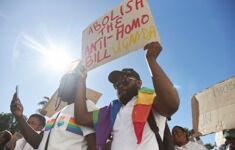The landscape of LGBTQ rights in Africa has seen significant challenges and setbacks over the past years. For decades, LGBTQ+ communities across Africa have faced discrimination and violence, but the reintroduction of draconian anti-LGBTQ+ laws took their persecutions to another level.
An unsettling trend has emerged across various countries where stringent anti-LGBTQ+ legislation has not only curtailed rights but also increased the dangers of using social media and dating apps for the LGBTQ community.
Related:
One year later, Uganda’s anti-LGBTQ+ law is destroying families, lives, & future peace
Ugandans explain how the law has reversed decades of progress, and also turned families and neighbors against one another.
In this digital age, the internet and social media serve as critical platforms for LGBTQ+ individuals to find a community, express themselves, and connect with others more safely. However, the pervasive anti-LGBTQ+ sentiment and legislation significantly affect how these platforms are used; homophobes are infiltrating and saturating the digital spaces, transforming previously safe havens into high-risk zones.
Global perspectives delivered right to your inbox
Our newsletter bridges borders to bring you LGBTQ+ news from around the world.
Discreetly living as a gay man in Ghana has not been easy for Kofi. Being gay is illegal in Ghana and carries a three-year prison sentence, so Kofi was always careful and strictly used dating apps to meet people until a recent harrowing incident changed the trajectory of his life.
Kofi met Peter on Tinder. They had been chatting for three months before Peter asked him to come visit, only to be met with violence when he arrived. A decision Kofi said he will always regret till the day he dies.
Afraid of public abuse and police harassment, members of the LGBTQ+ community use online apps to meet partners. Grindr (a dating and hookup app curated for gay and bisexual men ) and other flexible dating apps like Tinder, Badoo, and Bumble have functioned as effective platforms for quer people to connect and pursue sexual or romantic relationships. At least, they did until the apps were overrun by marauding criminals who pose as potential online dates to blackmail, kidnap, assault, extort or murder queer individuals. This pattern is also seen in other countries where being a sexual minority is dangerous.
“I wished they shot me dead or I had gotten in a fatal accident before I got there, than to be dealing with what I have been going through these past months.” the 26-year-old said. “They ruined my life.”
Upon getting to Peter’s house, Kofi realized he had been set up the moment five men came out of the bedroom and Peter’s cute smile suddenly disappeared from his face. Before he could do anything, the men pounced on him, hitting him with their fists and sticks until he passed out.
“I was naked with my hands and feet tied by the time I regained consciousness. I was bruised and bleeding while they recorded a video of me and sent it to my family after they made me unlock my phone. My parents pleaded with them to let me go but they asked for 3 million naira ($2,500) while threatening to kill me.” Kofi told LGBTQ Nation.
Unable to settle with his parents, his abductors got frustrated and started hitting him again, Kofi said he could hear his mom crying on the phone at some point. He was kept in an empty room, gagged and chained around his neck to a pillar where he was fed biscuits and water for two days before they eventually let him go after his family was only able to raise 650 thousand naira ($542).
Many African countries have laws that criminalize same-sex relationships and non-heteronormative expressions that deviate from traditional gender and sexual norms. Countries such as Nigeria, Ghana, Kenya, and Tanzania impose severe penalties like long prison sentences, except for Uganda which signed the death penalty into law last year. The enforcement of these laws not only poses a direct threat to the personal freedoms of LGBTQ+ individuals but also fosters an environment of violence, fear, and injustice.
With laws criminalizing same-sex relationships, it is difficult to seek help and protection from the police in situations like this as the police seldom intervene to protect LGBTQ+ people from violence and abuse.
Due to the strong anti-LGBTQ sentiments and social ostracism prevalent in African communities, families of victims never try to seek justice for their loved ones, instead, they conceal it to avoid a scandal that will be publicly humiliating for them. This wasn’t the case for Kofi because two days after the incident, his abductors sent the degrading video to his entire WhatsApp contact list. It went viral in his school and eventually made him drop out.
The interaction between stringent anti-LGBTQ+ laws and the pervasive use of social media creates a climate where the quest for love and acceptance is now shadowed by fear and danger. These laws have also emboldened civilians, criminals, extremists, and even law enforcement to target and exploit LGBTQ+ individuals.
John, a 29-year-old gay man living in Uganda, said he fell victim to a similar situation as Kofi which landed him in a hospital. His assailants beat him up, emptied his bank accounts, and made him take them to his house where they outed him to his neighbors and carted away with his belongings while his neighbors watched. Seeing his condition, one of his neighbors was sympathetic enough to take him to the hospital where the police got involved. Instead of going after his attackers, the police extorted him after they learned he was a homosexual. John was able to evade arrest by asking friends for help.
In Nigeria, the victimization of LGBTQ+ individuals — famously known as “Kito” — is a lucrative business. These criminals — which operate in gangs from organized and serviced apartments — are using violence, kidnappings, rape, and banking machines to extort money from their victims.
They’ve infiltrated LGBTQ+ spaces, studying gay dating apps and queer slang while posing as queer people online to lure victims. Sometimes this could go on for months just to get users to trust them.
TIERs (The Initiative for Equal Rights), in conjunction with 22 rights groups across Nigeria, reported that about 70% of 996 human rights violations against LGBTQ+ people in 2023 were kito cases. Worsening economic situations in the country reportedly led to this surge. Experts suspect the number of cases is likely higher than reported.
Despite these scenarios, the anonymity and discretion provided by these apps can be a double-edged sword. These apps are often ill-equipped and lack protective measures to handle the challenges faced by LGBTQ+ users in red zone regions.
Many LGBTQ+ individuals often use pseudonyms or anonymous accounts to conceal their identities. This anonymity, while protective, also limits the authenticity and transparency of online interactions. Although some apps have implemented features like disappearing messages, screenshot blocking, location masking, and discreet app icons, these measures can only offer limited protection.
Moreover, African media and journalists are participating in and enabling homophobia through misinformation. A recent sting operation on May 10 led to the arrest of 11 suspects who were members of a kito gang victimizing gay men in Lagos, Nigeria. But the local media twisted the story and reported that it was “a vicious gang of homosexuals that kidnap, extort and rape their male victims.” This report caused an uproar where people started clamoring for the adoption of Ugandan death penalty laws when these were actually crimes committed against the LGBTQ+ community.
As the digital landscape continues to evolve, innovative strategies will be essential in ensuring that LGBTQ+ individuals can safely and authentically connect, express themselves, and find community online; as social media is vital for building support among LGBTQ+ individuals.
So improving safety, building supportive networks, and advocating for legal reforms are crucial in mitigating the adverse effects of these laws. On the other end; as much as these laws create barriers and risks for LGBTQ individuals, they also highlight the resilience and adaptability of the communities to assert their rights to be their authentic selves.
Don't forget to share:














